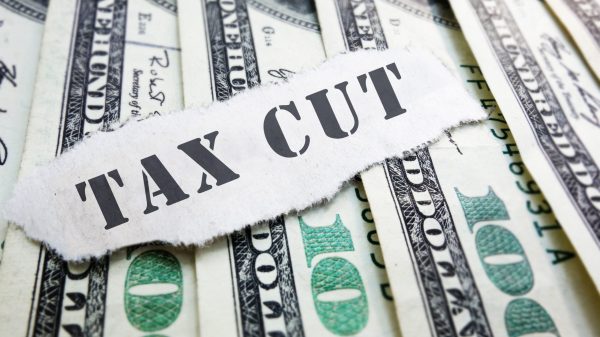By Chip Brownlee
Alabama Political Reporter
With high revenues and confidence in the budgets this year, state lawmakers are hoping for what could be as high as a 2.5–3 percent pay raise for K-12 educators and state employees.
Gov. Kay Ivey proposed the pay increase in her first State of the State Address last week but the Governor and other officials have been vague on how large the pay increase could be. State employees haven’t received a cost-of-living pay raise since 2009 and educators haven’t seen one in two years.
Ivey’s proposed Education Trust Fund budget shows an increase of $92 million for cost-of-living raises for educators, which could amount to a little more than a 2 percent raise. An increase of a percentage point for teachers would cost the budget about $40 million.
State Sen. Gerald Dial, R-Lineville, who has long been influential in state education policy and has carried a hefty role providing oversight for the State Board of Education, said the raises could provide as much a 3 percent increase across the board.
“This is a great education budget, one of the best budgets ever,” Dial said. “We’re going to give the teachers a pay raise, which they deserve. I think it will be somewhere between 2.5 and 3 percent.”
A 3 percent raise would cost the education budget around $120 million a year, and on top of the pay raises, Republicans are also floating a $4 million–$6 million income tax break. Both the increase and the tax break would amount to small portions of the overall $6.6 billion proposed budget, but a larger percentage of this year’s budget increase.
The proposed education budget is $216 million larger than last year’ — a little more than 3.3 percent. On top of the $92 million proposed for pay raises and $6 million for an income tax break, which wouldn’t necessarily reflect on this year’s budget, lawmakers are also set to consider Ivey’s proposals to increase higher education funding by $50 million and appropriations for the state pre-K program by $23 million.
But some Democrats say the increases are not enough.
“I think that is long overdue,” said House Minority Leader Anthony Daniels, D-Huntsville. “We’ve heard a whole lot about that in election years, but we look forward to working with her on that. I wish there was a 5 percent pay raise because back several years ago we increased what educators pay into retirement benefits. We need to get back to those levels.”
Educators still have not returned to their pre-recession pay levels when benefits and insurance costs are taken into account. Lawmakers hope pay increases this year will get them closer to their previous levels.
“I don’t think the question is if, I think the question is how much,” said Sen. Cam Ward, R-Alabaster. “Both teachers and state employees are long overdue for a pay raise.”
Such an increase is made possible by large revenue growth from income and sales taxes, the two largest revenue sources for the education trust fund. The increase has been fueled in large part by solid economic growth in recent years, particularly in the last year as Alabama’s unemployment rate reached record lows.
“When you lower unemployment by 1 percent, you create about $250 million in new revenue,” Dial said. “It’s self-growth. Get jobs, jobs create the money, and the money goes to education. So we’re going to grow our way through this without raising taxes.”
Even the state’s General Fund — typically beleaguered by large requests from the state Medicaid Agency and the Department of Corrections — appears solvent this year. While Ivey is proposing a dramatic increase in funding for the Department of Corrections, Medicaid is believed to need less funding than expected. Lawmakers also set aside more than $90 million in surplus funding last year anticipating larger requests in 2018.
“With the growth we’ve had and the decrease in Medicaid enrollees, that’s giving you that breathing space on the General Fund side. That allows us to deal with the prisons. That allows us to deal with a pay raise,” Ward said. “But we’re not going to be able to do an exorbitant pay raise.”
Ward said the state would need to stay within its means but new revenues does give them “wiggle room” they haven’t had in recent years.
“They haven’t had a pay increase since 2009,” Ward said. “I don’t know of anybody else, any other profession that hasn’t had some sort of cost-of-living adjustment since then. Costs have gone up. Prices have gone up, but their wages haven’t gone up. They do a good job, and they deserve a raise.”
Former Gov. Robert Bentley proposed a 4 percent pay raise for state employees last year but it never came to fruition. Lawmakers instead decided to set aside money in anticipation of unknown costs this year — costs that may end up rearing their head.
Even a small increase for state employees may not be cut and dry. One unknown looms over the prospect of a pay raise for the employees, who would receive that increase out of the state’s General Fund budget.
“There is a huge question mark there, though, and that’s the CHIP program,” said House Speaker Mac McCutcheon, R-Monrovia. “You’re looking at what could be as high as a $60 million ask there to try to supplement that program if the federal government doesn’t continue what they’re doing now.”
Congress failed to re-authorize the program in September, leaving states wondering how they would continue their programs. Alabama was set to disenroll children starting in February but Congress passed a short-term funding bill in December. But that is set to run out in March and lawmakers haven’t been able to agree on a longterm solution.
“We cannot address the budget without having some kind of assurance of whether it’s either going to be taken care of or if we’re going to have to allocate some money for it,” said the speaker, who’s now in his second term as Alabama’s top lawmaker. “That $60 million is a lot of money coming out of that General Fund budget, which we need to keep in mind. We’ll have to work through the process and see.”


















































